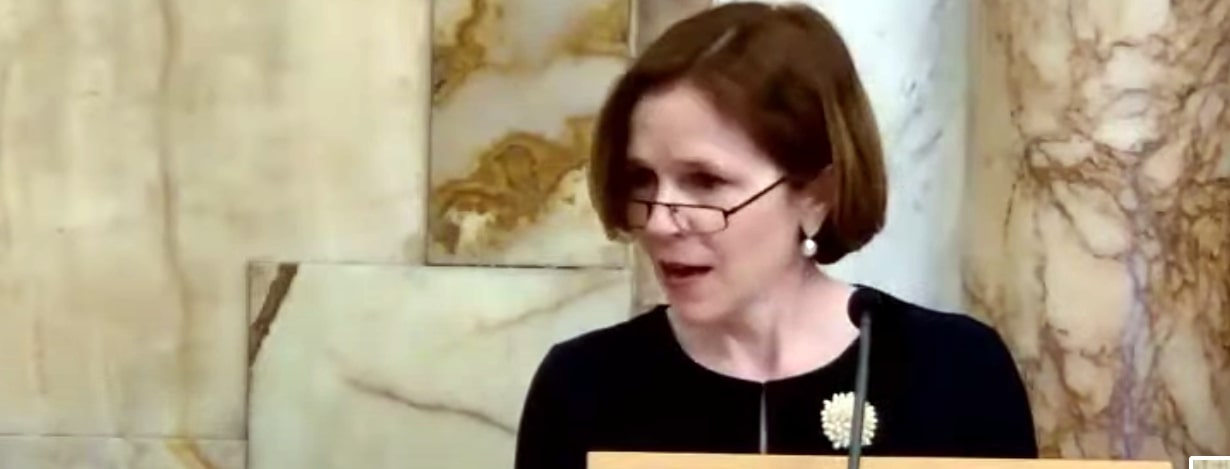 Síofra O'Leary, President of the European Court of Human Rights
Síofra O'Leary, President of the European Court of Human Rights
Ireland is in ‘vanguard’ on minority rights – O’Leary
Judge Síofra O'Leary, President of the European Court of Human Rights (ECtHR), spoke last night about rights conferred by European law on different groups in Irish society.
Ireland’s EU journey from isolation to integration had led to repeated transformation driven by many factors, she said, at a St Brigid's Day EU50 lecture (1 February), at the Department of Foreign Affairs in Iveagh House, Dublin.
Respect for private life
The Norris ruling from the ECtHR was of real importance, in its vindication of the right to respect for private life, the judge said.
That case also demonstrated the discordance, in this area and at that time, between the Irish Constitution and the European Convention on Human Rights, O’Leary added.
It also showed that Irish law was “out of step” with the laws of most other Council of Europe member states, she stated.
Vindication
“The Norris case can still be seen as something of an archetype of the convention system – where certain individual rights and freedoms are curtailed at the national level, they may ultimately find their vindication through the processes of the international legal order,” she stated.
Contemporary Ireland stood out as a society that displayed the hallmarks of democracy, as required by Strasbourg jurisprudence in the 1980s, she stated.
Liberal stance
“[Ireland] needed to be beckoned by the Strasbourg court to move towards a more liberal stance in relation to some of its laws,” she added.
It has now placed itself in the vanguard when it comes to the rights and freedoms of sexual minorities, she said, though the protections sought by Norris in the 1980s were still sought in many other European countries today.
She referred to a judgment she handed down two weeks ago against Russia, reiterating that article 8 of the European Convention on Human Rights required states to provide a legal framework allowing same-sex couples to be granted adequate recognition and protection of their relationship.
This was a landmark case in a time when sexual minorities were facing adversity and hostility in many European states, she added.
While tolerance and broadmindedness, along with pluralism, were hallmarks of a democratic society, over time other principles and values, such as respect for human dignity, individual freedom, and respect for diversity and inclusion, had also come to the fore, she stated.
Diversity as enrichment
The convention rejected any stigmatisation based on sexual orientation, and perceived diversity not as a threat, but as a source of enrichment, the ECtHR president added.
However, the European Convention on Human Rights had not been the sole, or even the major, driver of Ireland’s transformations over the past 50 years, she stated.
It was not the vocation of a human-rights treaty or international human-rights judges to “override, substitute or compete” with a country's fundamental laws or constitutional identity, she said.
Recent Irish Supreme Court findings in the human-rights sphere had at their disposal a wealth of Strasbourg jurisprudence, despite routing their legal response in the Irish Constitution, O'Leary said.
“A truer description of the contribution from Strasbourg would be to say that, in some respects, the court has brought oxygen to ongoing national debates and, in others, it was able to address certain blind spots within the Irish legal system,” she said.
Painful road
Ireland's engagement with questions relating to the termination of pregnancy had been a long, painful, and winding road, and that road led repeatedly to Strasbourg, she said.
The ECtHR allowed a wide margin of appreciation for the State in deciding where the balance was to be struck between the profound moral values of the Irish people as to the nature of life, and the important personal rights at stake in those abortion cases, she added.
Public interest
The public interest must stand in a relationship of proportionality to the right of the individual that had suffered interference, she stated.
“In many other cases, the Strasbourg court has successfully nudged states into recognising and rectifying their blind spots,” she stated.
Gazette Desk
Gazette.ie is the daily legal news site of the Law Society of Ireland